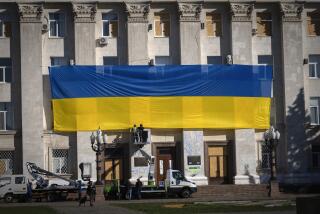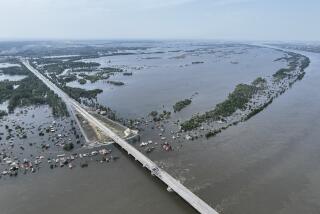Chechens Find a Way to Live Off the Land--Through Oil
- Share via
GROZNY, Russia — Oil-stained Movsar Muzayev looks his visitors over closely and then gestures for them to follow him to a trash heap at the back of his house, overlooking the smoke-gray Sunzha River.
He kicks aside a few garbage bags and lifts a scrap of sheet metal to reveal, unexpectedly, a cylindrical steel boiler about the size of a small car buried in the riverbank. From it protrudes a Rube Goldberg agglomeration of pipes and tubes. Beneath the tank burns a carefully tended fire.
Next, he points to a hose that emerges from the contraption, disappears into the river and reemerges on the riverbank, where it runs into a steel drum a few yards away. A clear, bluish liquid is dripping from the hose: gasoline.
Desperation is the mother of invention in Grozny, a place where former taxi drivers, mechanics and bricklayers like Muzayev are turning themselves into amateur petroleum engineers.
Taking advantage of a unique ecological problem--millions of gallons of gasoline and diesel oil that have spilled into an underground reservoir beneath the Grozny, the capital of Chechnya--freelance operators dig into their basements and backyards to extract this cocktail of pollution.
There are rubles in that soup.
But it is dangerous, unhealthy work. There are unexploded shells and men in uniform demanding bribes--or following orders to stamp out such bootleg producers. Muzayev also has to wrestle heavy barrels in all weather conditions and take care to keep the fire steady so that the condensed fuel does not back up and cause an explosion.
Muzayev, who already looks older than his 41 years, believes that his backyard refinery is making him sick. “But what can I do?” he asks. “I have to feed my children.”
Muzayev is following a generations-old tradition in the Chechen capital, which was one of the early boom towns of the petroleum industry in the Caucasus Mountains. Oil has been extracted commercially since the 1890s, and at the beginning of the 20th century, Grozny was the second oil capital of the Russian empire, after Baku. In Soviet times, its importance as an oil producer fell, but it remained a center of the refining industry.
That long history of extraction has led to one of the world’s worst cases of petroleum spillage, said Sharputdin Zaurbekov, chairman of the ecology department at the Grozny State Oil Institute, a school still turning out graduates despite Chechnya’s civil war and economic collapse.
In the early days of the industry, refiners were interested only in kerosene, and all other products were poured back into the earth, he said. And in Soviet times, he added, “You know the attitudes toward nature.”
As a result, a vast “lake” of spilled fuel lies beneath Grozny, in some places just a few yards above the water table.
“Thank God, it has not reached our drinking water. But logically, it is very close,” Zaurbekov said. Many Grozny residents take their water from wells.
But one man’s ecological disaster is another’s meal ticket.
Bislan Abubakarov, 24, got into the business after his family, which had fled the fighting last year between federal troops and Chechen separatists in the Russian republic, returned to Grozny and found no way to earn money. Recalling that some sewer workers had struck fuel years earlier, he said he decided to investigate for himself.
In the courtyard of a ruined house across the street from where he lived, he and some friends descended into the sewer and broke through its brick floor. They needed to excavate just a few more feet until they struck the spill. Now they bring the murky liquid to the surface with buckets and pumps and sell it to processors.
He estimates that they have taken at least 200 tons out of this hole, and they have dug others in the area. He sells the fuel, which he says is mostly gasoline, to a bootleg refiner like Muzayev for 1.2 rubles a quart, and ends up with about 1,000 rubles (about $36) a day in profits.
But one constant worry is the payoffs that must be made to keep operating, he said. “Soldiers come here and threaten to shoot up the place,” Abubakarov said. “We pay 1,000 rubles a hole a week in protection--and sometimes more--because different groups come and you have to pay them too to be safe.”
Danger, however, is an everyday facet of life in Grozny, he said, showing reporters a 20-foot-long military rocket half buried in the earth behind his house. Soldiers offered to explode it for him, for a fee, he said, but he begged off: “It would blow up my business.”
Magomet and Khasan Dakhtayev, brothers who deliver the fuel to the processor, nodded in agreement as Abubakarov spoke of the bribes he must pay.
“We have to pay everybody, even the Chechen militia,” said Magomet, 27. “There is one law here--whoever has a uniform is king of the road, whether he is a Chechen or a Russian. So, little changes in this profession since the federals came here.”
Muzayev also is a recent convert to the oil business. With most of Grozny in ruins, there is plenty of work for a bricklayer like him, he said, but no one has money to pay for his skills. But plenty of people are willing to pay for gasoline.
“I learned this art secondhand,” he said. “An acquaintance of mine was processing, and I put everything I had into copying his equipment. There was no blueprint--I did it with my own eye.”
As he explained, when he heats the cocktail to 120 degrees Celsius, gasoline vaporizes. The vapor is cooled as it passes through the hose running through the river and emerges again as liquid. At higher temperatures, 150 to 200 Celsius, he gets diesel.
The residue is useful as lubricating oil. Muzayev sells his product to small-time wholesalers for 3.5 rubles (about 12 cents) a quart, and it ends up being sold to drivers on street corners, dispensed in glass jugs.
Although Russian troops in the area often destroy small refineries like his when they find them, Muzayev said he has no apologies to make.
“We are not stealing. We use something that was dumped, and that business gives life to my family and to my brother’s family. It gives life to the republic. If not for us, life would stop here.”
Russian forces now in control in Grozny are supposed to be shutting down producers like Muzayev on grounds that they are exploiting the state’s petroleum wealth illegally. When they find holes for extracting the fuel from the earth, or illegal oil wells, the troops shoot at them to set them ablaze.
As a result, at any one time, more than 40 oil fires are burning, sending black plumes of smoke into the atmosphere. Residents of Grozny say the smoke causes respiratory ailments and skin diseases, and they worry that it may be carcinogenic.
To Zaurbekov, the fires epitomize the world’s indifference to Grozny:
“After the [1991 Persian] Gulf War, the entire world managed to exterminate the burning well fires within a few months. And here, these wells are burning for more than a year. There are grandiose plans to put out the fires, but as you see, they are not being implemented.”
Thousands of holes have been dug in Grozny to extract fuel, making the city a kind of Swiss cheese. Zaurbekov recalled an old legend that says Grozny will someday disappear into the earth. But he suspects that its fate will be different with all the amateurs digging around:
“Fire is the danger, not sinking. . . . One day, the entire city of Grozny may just explode into the air.”
*
Sergei L. Loiko of The Times’ Moscow Bureau contributed to this story.
More to Read
Sign up for Essential California
The most important California stories and recommendations in your inbox every morning.
You may occasionally receive promotional content from the Los Angeles Times.













